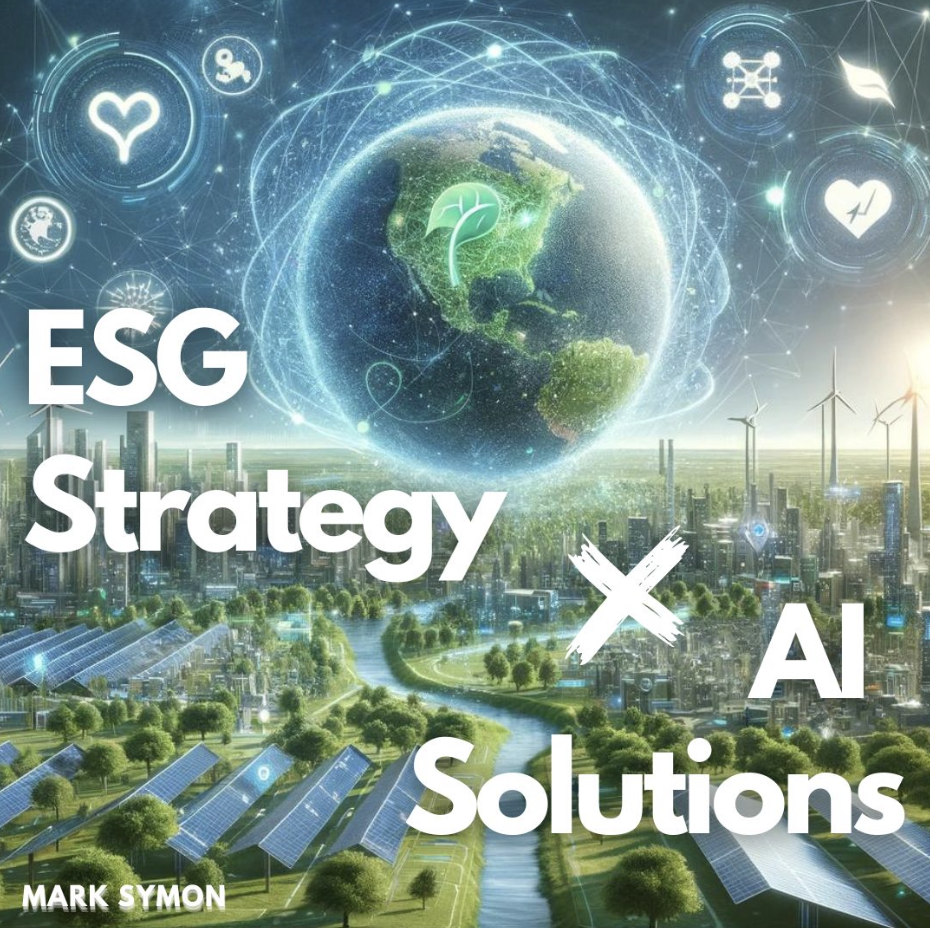By ESG Analyst Mark Symon

In an era where sustainability and corporate responsibility are so important, the role of artificial intelligence in catalyzing these initiatives cannot be overstated. AI is not just a supplementary technology but a tool that can reshape ESG strategy as a whole. It elevates sustainability reporting, fortifies compliance, and enriches decision-making frameworks, addressing the many problems and complexities of ESG metrics. Through a detailed exploration, this article aims to discuss the transformative impact that AI has on ESG endeavours, spotlighting cutting-edge advancements and real-world applications.
Revolutionizing ESG Reporting and Compliance
Generative AI and data fabric models are some of the AI technologies that have taken over ESG reporting and compliance landscapes. For example, businesses use generative AI platforms to automate and customize their ESG reports across different geographies thereby increasing their operational capacity and providing complex inputs (EY, 2023). The use of AI gives corporations places where they need to focus on allowing for efficient change to be made. As for data fabric solutions, they offer a strong ground for harmonizing and standardizing various data sources that are critical for making accurate – trustworthy ESG disclosures (IBM, 2024). These solutions allow for fewer reporting errors and biases to come out, a solution that has been needed in the ESG space since its inception. Harnessing the power of AI to create proper ESG disclosures and efficiencies within corporations’ ESG initiatives allows for change to be made faster and more informed.
Navigating Data Complexities with AI
Historically, there have been many challenges when managing unstructured and incompatible data which has inevitably impeded the efficient progression of ESG initiatives. Traditional data management techniques often struggle to convey and incorporate the many different intricacies of ESG data. AI’s ability to offer scalable and dynamic frameworks revolutionizes the entire spectrum of data handling, from collection to analysis and application. The application of technologies such as computer vision breaks through conventional data analysis barriers, facilitating advanced environmental risk assessments and broadening the scope for in-depth ESG evaluations (Accenture, 2023). This application of AI not only solves the data challenge head-on but also significantly expands the potential for comprehensive ESG evaluations, ensuring more accurate and actionable insights
AI as a Keystone for ESG Strategy Enhancement
AI’s implementation across ESG initiatives leverages techniques like Natural Language Processing (NLP) and machine learning to dissect and comprehend the complex layers of ESG factors with unparalleled accuracy. This strategic use of AI not only addresses challenges related to data standardization and quality but also transforms heterogeneous data into standardized, actionable insights (KPMG Canada, n.d.). The process amplifies the reliability of ESG data, empowering stakeholders to base their decisions on solid, sustainable grounds. Furthermore, AI’s role in improving data quality and standardization underscores a commitment to transparency, accountability, and trust—fundamental elements that bolster the credibility of any sustainability endeavour (WorldQuant, n.d.).
Envisioning a New Era in ESG Strategy
The integration of AI within ESG frameworks signifies a pivotal shift towards more efficient and effective sustainability practices. As technology continues to advance, the potential for AI to spearhead ESG innovations expands, offering organizations a large opportunity to make change. This progression goes above just compliance; it embodies a deeper commitment to transparency and accountability, striving to surpass expectations in the sustainability space for stakeholders and shareholders. The fusion of AI and ESG initiatives represents more than an evolution; it is a strategic realignment toward a sustainable future. By leveraging AI’s capacity for deep analysis, data standardization, and insightful reporting, corporations can navigate the complexities of a more sustainable and responsible environment with greater precision. As we stand on the brink of this new era, the promise of AI in crafting a sustainable, equitable future is not only intriguing but also within reach, allowing for a transformative period for ESG strategies worldwide.
References
EY. “How Generative AI Can Build an Organization’s ESG Roadmap.” EY, 2023, www.ey.com.
IBM. “How the Right Data and AI Foundation Can Empower a Successful ESG Strategy.” IBM, 2024, www.ibm.com.
Accenture. “ESG Investing: All Eyes on Data and AI | Accenture Capital Markets Blog.” Accenture, 2023, capitalmarketsblog.accenture.com.
KPMG Canada. “Using AI to Advance ESG.” KPMG, n.d., home.kpmg/ca/en.
WorldQuant. “Using AI to Tackle the ESG Data Challenge.” WorldQuant, n.d., www.worldquant.com.
